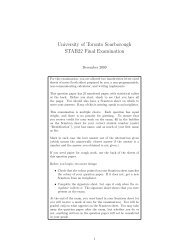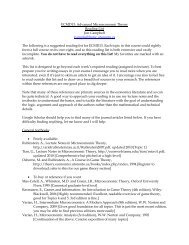Annual Review - University of Toronto Scarborough
Annual Review - University of Toronto Scarborough
Annual Review - University of Toronto Scarborough
You also want an ePaper? Increase the reach of your titles
YUMPU automatically turns print PDFs into web optimized ePapers that Google loves.
for a healthy Planet<br />
Partners for<br />
Tomorrow, Today<br />
PRoFeSSoR MyRNA SIMPSoN,<br />
DePARTMeNT oF PHySICAL AND<br />
eNVIRoNMeNTAL SCIeNCe<br />
“Pr<strong>of</strong>essor Simpson has a deep<br />
understanding <strong>of</strong> molecular<br />
biochemistry and applies that<br />
knowledge to an ecosystem scale.<br />
She has a very unique set <strong>of</strong> skills,<br />
which provides us with crucial<br />
insight into how climate change<br />
will affect carbon cycle dynamics.”<br />
Dr. ed Gregorich, Fellow <strong>of</strong> the Canadian<br />
Society <strong>of</strong> Soil Science and research scientist<br />
at Agriculture and Agri-Food Canada<br />
AT UTSC we STRIve to connect the<br />
dots between academic excellence<br />
and real-world engagement. By<br />
nurturing research partnerships with<br />
outside organizations whenever<br />
we can, we continually expand our<br />
sphere <strong>of</strong> influence and ensure that<br />
the breakthroughs happening on<br />
our campus have maximum impact<br />
on the wider world.<br />
when scientists at Agriculture and<br />
Agri-Food Canada (AAFC) – the federal<br />
ministry responsible for agricultural<br />
sustainability across the country –<br />
became concerned about the amount<br />
<strong>of</strong> carbon being released from our soils<br />
due to global warming, they enlisted<br />
one <strong>of</strong> UTSC’s leading researchers<br />
to help them figure out how to make<br />
more <strong>of</strong> that carbon stay put.<br />
Pr<strong>of</strong>essor Myrna Simpson is worldrenowned<br />
for her soil research<br />
techniques. She is the co-founder <strong>of</strong><br />
the environmental Nuclear Magnetic<br />
Resonance (NMR) Centre at UTSC,<br />
the only facility in Canada dedicated<br />
to the development and application<br />
<strong>of</strong> NMR techniques specifically for<br />
research in environmental science.<br />
Simpson is collaborating with the<br />
AAFC on a groundbreaking 10-year<br />
carbon sequestration study.<br />
The goal <strong>of</strong> the study is to answer<br />
one <strong>of</strong> the most pressing questions<br />
facing environmental scientists today:<br />
How do climate conditions such as<br />
temperature or moisture content affect<br />
whether or not carbon residues in the<br />
soil remain intact for the next growing<br />
season, or become degraded and<br />
eventually lost to the atmosphere?<br />
This question is a critical one because<br />
the more carbon is lost, the more our<br />
soils become infertile and susceptible<br />
to erosion, and the more havoc is<br />
wreaked on food production worldwide.<br />
“The only way to answer this question<br />
is with NMR,” says Simpson. “That’s<br />
why they called me.”<br />
NMR is the most powerful technology<br />
available for characterizing the<br />
composition <strong>of</strong> matter. Researchers at<br />
AAFC send soil samples from 11 field<br />
sites to Simpson, and she performs<br />
high-resolution molecular analyses<br />
on them that no one else in Canada<br />
is capable <strong>of</strong> doing. This biochemical<br />
data will help government scientists<br />
determine how best to supplement<br />
the carbon in the soil in a variety <strong>of</strong><br />
environmental conditions, so that it<br />
stays in the ground. Then they will<br />
be one step closer to helping farmers<br />
protect, and even boost, the<br />
productivity <strong>of</strong> their soil.<br />
“with the results <strong>of</strong> this study,” says<br />
Simpson, “we’ll have a better idea<br />
<strong>of</strong> how – and in what form– we might<br />
be able to add carbon residues to<br />
our soils to help combat the effects<br />
<strong>of</strong> climate change. we are producing<br />
results that could directly influence<br />
agricultural practices in Canada and<br />
around the world.”<br />
14 UNIVeRSITy oF ToRoNTo SCARBoRoUgH


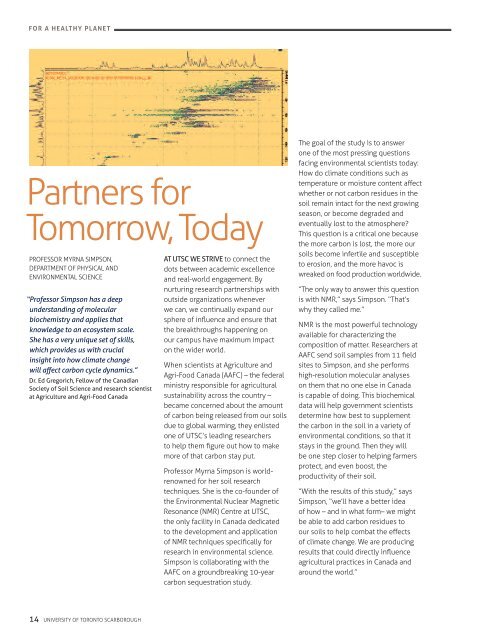
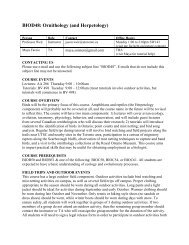
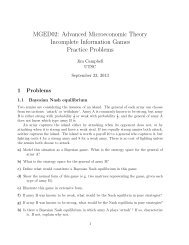
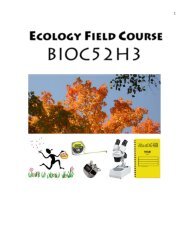
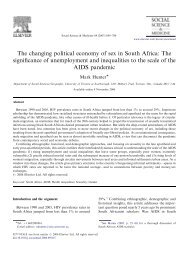
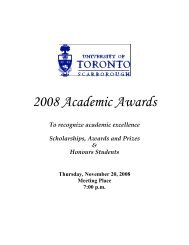
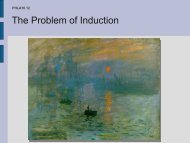
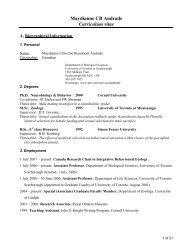
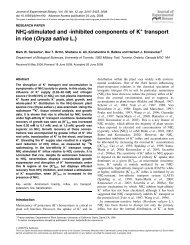
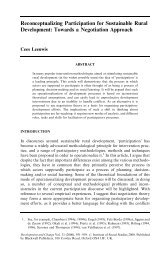
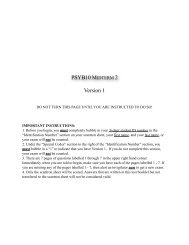
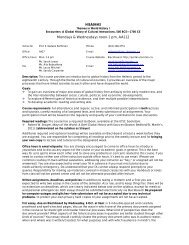
![[Enter course name - Syllabus] - University of Toronto Scarborough](https://img.yumpu.com/50068522/1/190x245/enter-course-name-syllabus-university-of-toronto-scarborough.jpg?quality=85)
